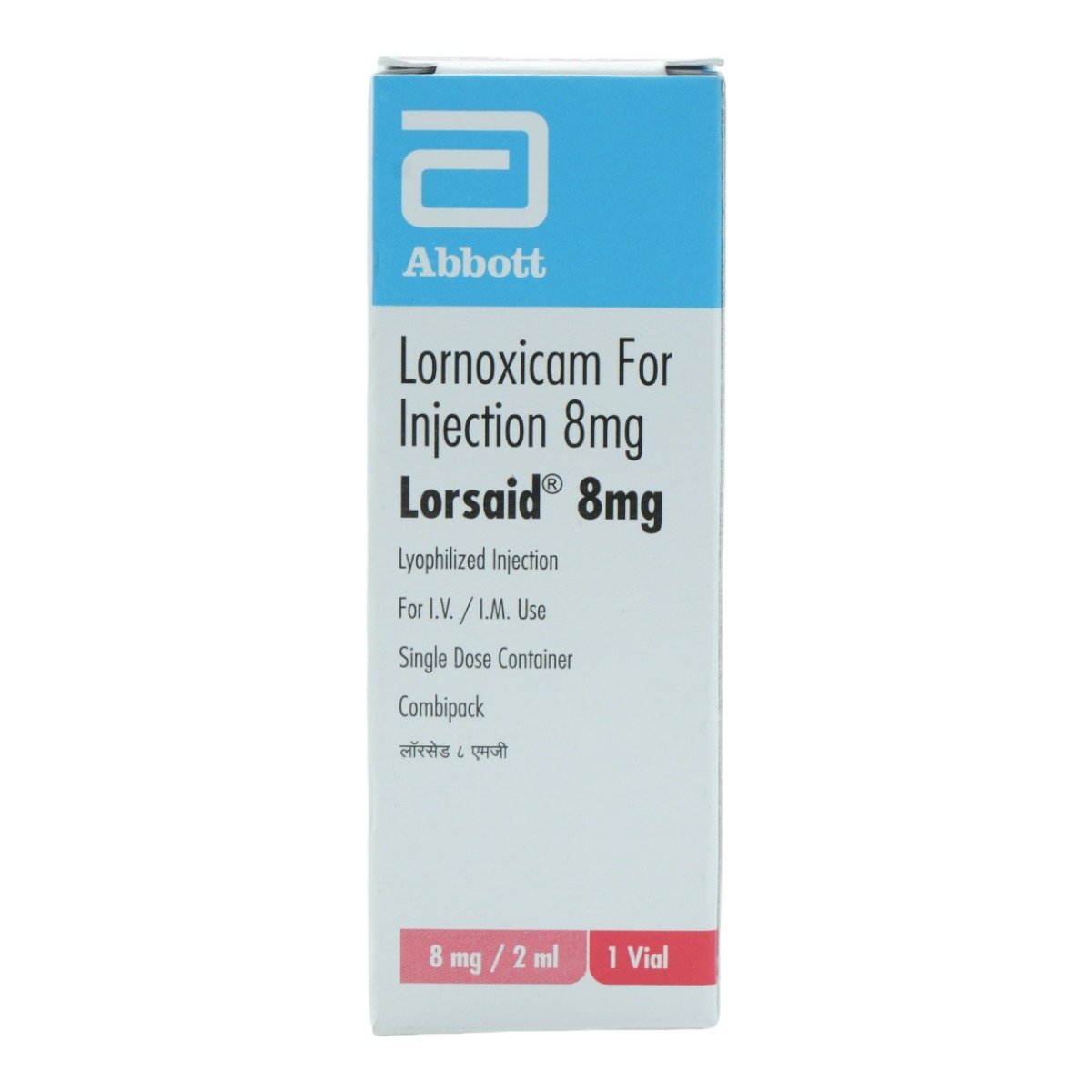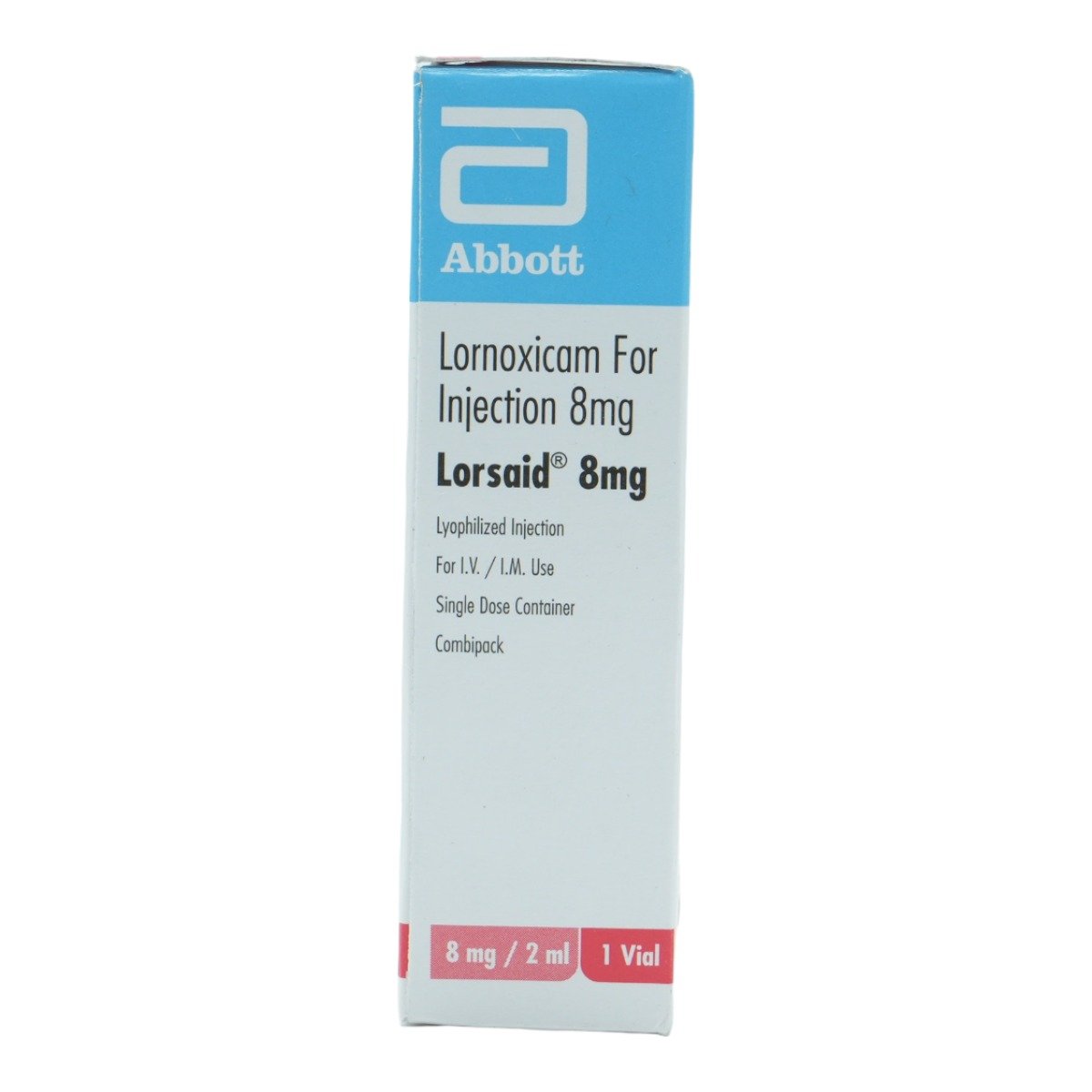Lorsaid 8 mg Injection 2 ml


MRP ₹111.5
(Inclusive of all Taxes)
₹16.7 Cashback (15%)
know your delivery time
Provide Delivery Location
Composition :
Manufacturer/Marketer :
Consume Type :
Expires on or after :
Return Policy :

Secure Payment

Trusted by 8 Crore Indians

Genuine Products
Therapeutic Class
Country of origin
Manufacturer/Marketer address
Author Details
We provide you with authentic, trustworthy and relevant information
Disclaimer
Alcohol
Safe if prescribed
It is not known if alcohol interacts with Lorsaid 8 mg Injection 2 ml. Please consult your doctor.
Pregnancy
Consult your doctor
Lorsaid 8 mg Injection 2 ml is contraindicated in the third trimester of pregnancy and should not be used during pregnancy in the first and second trimesters and delivery. As no clinical data is available on its use, please consult your doctor if you are pregnant before taking Lorsaid 8 mg Injection 2 ml.
Breast Feeding
Consult your doctor
It is not known if Lorsaid 8 mg Injection 2 ml passes into breastmilk. Therefore, it is not recommended during breastfeeding. Please consult your doctor if you have any concerns.
Driving
Safe if prescribed
Lorsaid 8 mg Injection 2 ml may cause dizziness and/or sleepiness. Do not drive or operate machinery unless you are alert.
Liver
Consult your doctor
Dose adjustment may be needed in patients with liver impairment. Please inform your doctor if you have a liver impairment or any concerns regarding this. Lorsaid 8 mg Injection 2 ml is not recommended in people with severe liver impairment.
Kidney
Consult your doctor
Dose adjustment may be needed in patients with kidney impairment. Please inform your doctor if you have kidney impairment or any concerns regarding this. Lorsaid 8 mg Injection 2 ml is not recommended in people with severe kidney impairment.
Children
Safe if prescribed
Lorsaid 8 mg Injection 2 ml is not recommended for children below 18 years as safety and effectiveness were not established.
Product Substitutes
About Lorsaid 8 mg Injection 2 ml
Lorsaid 8 mg Injection 2 ml belongs to a group of medicines called NSAIDs (Non-Steroidal Anti-Inflammatory Drugs) indicated for the short-term relief of acute mild to moderate pain. Pain is a symptom triggered by the nervous system, causing uncomfortable sensations in the body.
Lorsaid 8 mg Injection 2 ml contains 'Lornoxicam' which works by blocking the effect of chemical messengers that cause pain and inflammation. Thereby Lorsaid 8 mg Injection 2 ml provides relief from mild to moderate pain.
In some cases, Lorsaid 8 mg Injection 2 ml may cause headache, dizziness, nausea, abdominal pain, vomiting, diarrhoea, and indigestion. Most of these side effects do not require medical attention and will resolve gradually over time. However, you are advised to talk to your doctor if the side effects persist or worsen.
Consult your doctor if you are pregnant or breastfeeding. Lorsaid 8 mg Injection 2 ml may cause dizziness and/or sleepiness, so drive only if you are alert. Lorsaid 8 mg Injection 2 ml is not recommended for children below 18 years as safety has not been established. Keep your doctor informed about your health condition and medicines to rule out any side effects/interactions.
Uses of Lorsaid 8 mg Injection 2 ml
Medicinal Benefits Mweb
Key Benefits
Lorsaid 8 mg Injection 2 ml belongs to a group of medicines called NSAIDs (Non-Steroidal Anti-Inflammatory Drugs) used for the short-term relief of acute mild to moderate pain. Lorsaid 8 mg Injection 2 ml contains 'Lornoxicam' which works by blocking the effect of chemical messengers called prostaglandins that cause pain and inflammation. Thereby Lorsaid 8 mg Injection 2 ml provides relief from mild to moderate pain.
Directions for Use
Side Effects of Lorsaid 8 mg Injection 2 ml
- Headache
- Dizziness
- Nausea
- Abdominal pain
- Vomiting
- Diarrhoea
- Indigestion
Drug Warnings
Do not take Lorsaid 8 mg Injection 2 ml if you are allergic to any of its components if you have thrombocytopenia (low platelet level), severe heart failure, gastrointestinal bleeding, bleeding problems, active peptic ulcers, or severe hepatic or liver impairment. Inform your doctor if you have blood coagulation disorders, gastrointestinal bleeding, perforation, ulceration, ulcerative colitis, Crohn’s disease, high blood pressure, asthma, heart, liver or kidney problems. Do not take any other painkillers while on treatment with Lorsaid 8 mg Injection 2 ml. Consult your doctor if you are pregnant or breastfeeding.
Drug-Drug Interactions
Drug-Drug Interactions
Login/Sign Up
Coadministration of Lorsaid 8 mg Injection 2 ml with Ciclosporin can increase the risk or severity of kidney disease or high blood pressure.
How to manage the interaction:
Taking Lorsaid 8 mg Injection 2 ml with Ciclosporin together can possibly result in an interaction, it can be taken if your doctor has advised it. However, if you notice any headaches, heart palpitations, dizziness, lightheadedness, blurred vision, nose bleed, shortness of breath, severe headache, decreased urination, swelling, and weakness, you should contact your doctor immediately. Do not stop using any medications without first talking to your doctor.
Coadministration of Lorsaid 8 mg Injection 2 ml with Digoxin can reduce the excretion of Digoxin leading to accumulation in the body. This increases the risk or severity of kidney disease.
How to manage the interaction:
Taking Lorsaid 8 mg Injection 2 ml with Digoxin together can possibly result in an interaction, it can be taken if your doctor has advised it. However, if you notice any decrease in urination, swelling, severe headache, chest pain or tightness, and weakness, you should contact your doctor immediately. Do not stop using any medications without first talking to your doctor.
Drug-Food Interactions
Drug-Food Interactions
Login/Sign Up
Drug-Diseases Interactions
Drug-Diseases Interactions
Login/Sign Up
Drug-Drug Interactions Checker List
- WARFARIN
- HEPARIN
- PHENPROCOUMON
- TACROLIMUS
- CYCLOSPORINE
- CIMETIDINE
- METHOTREXATE
- LITHIUM
- DIGOXIN
- PEMETREXED
Habit Forming
Special Advise
- In people with long-term treatment, regular monitoring of haemoglobin, creatinine levels, and liver enzyme levels is recommended.
- In elderly patients, regular monitoring of renal and hepatic function is advised.
Diet & Lifestyle Advise
- Physical activity helps in strengthening muscles and relieves joint stiffness. Gentle activities like 20-30minutes of walking or swimming would be helpful.
- Performing yoga may also help in improving joint flexibility and pain management.
- Maintain a healthy weight by performing regular low-strain exercises and eating healthy food.
- Get adequate sleep as resting the muscles can help in reducing inflammation and swelling.
- De-stress yourself by meditating, reading books, taking a warm bubble bath or listening to soothing music.
- Acupuncture, massage and physical therapy may also be helpful.
- Avoid smoking and alcohol consumption.
All Substitutes & Brand Comparisons
RX
Out of StockLorezen 8mg Injection
Zencus Pharma
₹62
(₹27.9/ 1ml)
44% CHEAPERRX
Out of StockLotoz Injection 2 ml
Zota Health Care Ltd
₹68.5
(₹30.83/ 1ml)
38% CHEAPERRX
Out of StockVisilar Injection 2 ml
Vision Medilink
₹70
(₹31.5/ 1ml)
37% CHEAPER

Have a query?
Buy best C.n.s Drugs products by
Intas Pharmaceuticals Ltd
Sun Pharmaceutical Industries Ltd
Torrent Pharmaceuticals Ltd
Alkem Laboratories Ltd
Abbott India Ltd
Cipla Ltd
Alteus Biogenics Pvt Ltd
Micro Labs Ltd
Lupin Ltd
Ipca Laboratories Ltd
D D Pharmaceuticals Pvt Ltd
Icon Life Sciences
Mankind Pharma Pvt Ltd
Tripada Healthcare Pvt Ltd
Arinna Lifesciences Ltd
Linux Laboratories Pvt Ltd
East West Pharma India Pvt Ltd
La Renon Healthcare Pvt Ltd
Talent India Pvt Ltd
Tas Med India Pvt Ltd
Zydus Healthcare Ltd
Cnx Health Care Pvt Ltd
Eris Life Sciences Ltd
Leeford Healthcare Ltd
Emcure Pharmaceuticals Ltd
Macleods Pharmaceuticals Ltd
Sigmund Promedica
Aristo Pharmaceuticals Pvt Ltd
Dr Reddy's Laboratories Ltd
Troikaa Pharmaceuticals Ltd
Consern Pharma Ltd
Zydus Cadila
Shine Pharmaceuticals Ltd
Wockhardt Ltd
Ardent Life Sciences Pvt Ltd
Crescent Formulations Pvt Ltd
Theo Pharma Pvt Ltd
Reliance Formulation Pvt Ltd
Ikon Pharmaceuticals Pvt Ltd
Propel Healthcare
Neon Laboratories Ltd
Jagsam Pharma
Msn Laboratories Pvt Ltd
Morepen Laboratories Ltd
Pulse Pharmaceuticals
Sanofi India Ltd
Med Manor Organics Pvt Ltd
Hetero Healthcare Pvt Ltd
Novartis India Ltd
Crescent Therapeutics Ltd
Elder Pharmaceuticals Ltd
Solvate Laboratories Pvt Ltd
Akumentis Healthcare Ltd
Mova Pharmaceutical Pvt Ltd
Psyco Remedies Ltd
Tripada Lifecare Pvt Ltd
Ajanta Pharma Ltd
Cyrus Remedies Pvt Ltd
Medishri Healthcare Pvt Ltd
Cadila Healthcare Ltd
Glenmark Pharmaceuticals Ltd
Matteo Health Care Pvt Ltd
Hbc Life Sciences Pvt Ltd
Lyf Healthcare
Matias Healthcare Pvt Ltd
Mesmer Pharmaceuticals
Alembic Pharmaceuticals Ltd
Capital Pharma
Crescent Pharmaceuticals
Medopharm Pvt Ltd
Alniche Life Sciences Pvt Ltd
Kivi Labs Ltd
Talin Remedies Pvt Ltd
USV Pvt Ltd
Quince Lifesciences Pvt Ltd
Solis Pharmaceuticals
Infivis Life Care
Zuventus Healthcare Ltd
Cadila Pharmaceuticals Ltd
Pfizer Ltd
Wallace Pharmaceuticals Pvt Ltd
A N Pharmacia Laboratories Pvt Ltd
Blue Cross Laboratories Pvt Ltd
Jenburkt Pharmaceuticals Ltd
Lia Life Sciences Pvt Ltd
Mano Pharma
Medley Pharmaceuticals Ltd
Primus Remedies Pvt Ltd
FDC Ltd
Maneesh Pharmaceuticals Ltd
Apex Laboratories Pvt Ltd
Gagnant Healthcare Pvt Ltd
Ozone Pharmaceuticals Ltd
RPG Life Sciences Ltd
Strides Shasun Ltd
Unichem International
GlaxoSmithKline Pharmaceuticals Ltd
Kuresys Labs Pvt Ltd
LA Pharma
Trion Pharma India Llp

_0.jpg?tr=q-85)



